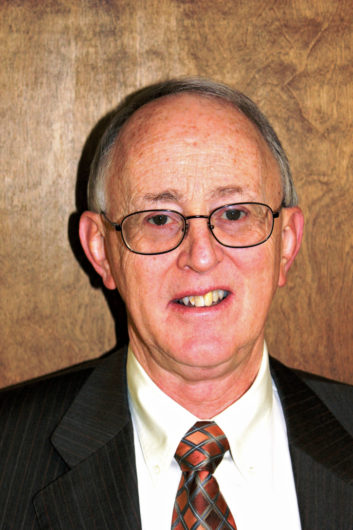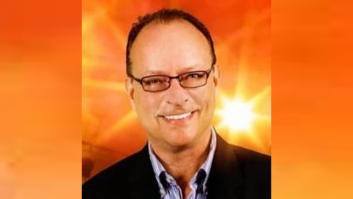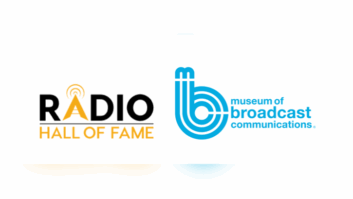
It is hard to find a bigger advocate of AM radio than Thomas F. King. Few people have pushed harder for the FCC to adopt new rules to help revitalize AM in the United States and place it back on competitive footing with FM and other media services.
King, president and CEO of Kintronic Labs Inc., has joined the honor roll of NAB Radio Engineering Achievement Award winners, a list that includes his father, Louis A. King, recipient in 2007.
The NAB’S engineering award recognizes significant contributions to broadcast engineering. King will be honored in Las Vegas during the NAB Show Technology Luncheon April 15. Richard Friedel, executive vice president and general manager for Fox Networks Engineering and Operations, will receive the NAB TV Engineering Achievement Award.
Kintronic Labs, headquartered in Bluff City, Tenn., designs, fabricates, installs and commissions analog AM and digital-ready AM terrestrial broadcast transmission systems, with projects domestically and in numerous countries overseas.
The company worked with Star-H Corp. to develop the Kinstar AM low-profile, high efficiency, wideband antenna. It was the first of its kind accepted by the FCC for full-time omnidirectional operation in the United States, according to the company.
Kintronic offers products and services from the transmitter port out, King said. “The transmission lines, towers, ground systems, RF feeder systems. All the hardware, too, including installation and commissioning.”
The 67-year-old King travels on international business a substantial amount of time; he’s out of the office “five to six weeks at a time,” often troubleshooting overseas projects.
“It really helps me to learn how our equipment is utilized overseas and how we can help broadcasters be more efficient.”
INTERNATIONAL PROJECTS
International projects now make up approximately 60 percent of Kintronic’s business. “It’s been that way since the domestic market went through the Great Recession. Asia and the Middle East have been very good for [Kintronic,] especially places like India, Korea and Vietnam.”
King was in Dubai in March for the CABSAT Convention, which organizers bill as the largest broadcast-related convention held in the Middle East.
Kintronic, which has 40 employees, completed a large project in India in 2014 for the rollout of Digital Radio Mondiale DRM30 digital broadcasting on the medium-wave AM band in that country, King said.
“We worked with Nautel on the project. We supplied new matching systems for 27 sites. These were all 100, 200 and 300 kW sites,” King said.
King admits he was seemingly born to be in the AM antenna business. He recalls testing vacuum tubes on summer break when he was young. By the time he reached high school, King was working in Kintronic’s manufacturing shop, cutting steel antenna tuning unit boxes, and painting.
After completing his high school education, King said his father gave him limited options when it came to higher education.
“There was only one college and one subject. It had to be the University of Tennessee, and it had to be electrical engineering,” he said with a chuckle.
He received both his bachelor’s and master’s degrees in electrical engineering from the school. King then completed two years of study at the University of Arizona, pursuing his Ph.D. in electrical engineering.
“I was really interested in optical science like lasers and electrical optics at that time.”
In 1973, King went to work for the U.S. Navy as a staff engineer in electro-optical system design at the Naval Weapons Center in China Lake, Calif., followed by a stint with General Research Corp., in McLean, Va., as project engineer in Infrared Countermeasures Systems for Navy and Marine Corps aircraft.
In 1983, King returned to Kintronic Labs to join the family business. His father suffered a stroke soon after. Tom King ascended to the presidency of the antenna manufacturer.
“It was really by God’s grace that I returned to the company when I did and was in a position to help my father,” King said. “He was working extremely hard and needed help.”
God is part of the Kintronic story; on the company website King states: “We know without a doubt that our company is what it is because of the grace and mercy of our Lord Jesus Christ. One thing that Louis knew to be true and that we as a company know to be true is that ‘Anything is possible with God.’ He is the one that makes all things possible.”
PROMINENT AM SUPPORTER
King is the author of numerous technical papers on the subject of AM broadcast antenna systems. He credits broadcast engineering friends and consultants Ron Rackley, Jack Sellmeyer and Ben Dawson for helping him through a period that was critical to the company’s long-term success. Rackley is a partner at du Treil, Lundin & Rackley; Sellmeyer is principal engineer for Sellmeyer Engineering while Dawson is president and senior electrical engineer of Hatfield and Dawson.
“Within two years my father had nearly fully recovered from the stroke and rejoined the business, working with me. That was about the same time we moved into our current facility,” King said.
Through the years, King has been a prominent supporter of AM broadcasting and has worked to educate others of the problems facing AM broadcasters. He points to the worsening electromagnetic environment and what he believes is the failure of consumer electronics industry to provide high-quality AM receiver systems as two of several challenges facing AM station owners.
King lauds the FCC for the commission’s work in the AM Revitalization Notice of Proposed Rulemaking, though he would go further than the initial six proposals being discussed. “The FCC must move immediately to enforce Part 15 unintentional radiator rules on utilities and others,” King said.
He predicts the FCC will move ahead with its AM plans soon after being “sidetracked” with Net Neutrality discussions.
Despite the obstacles in the way of AM’s revitalization, King remains optimistic about the long-term future of the senior band.
“I believe AM is going through a period of transition. I think it will eventually return to what it was designed to be and that is a local public service medium. I think it can compete again with FM with proper noise regulatory action by the FCC and minimum technical standards for receivers,” King said.
He proposes the idea of “a consortium of AM broadcasters” to meet with members of Congress and the FCC in Washington to address matters. “This is an urgent matter and AM broadcasters need to push forward with ideas that can help them,” King said.
King and his wife, Leigh, reside in Bristol, Tenn. They have four grown children.
For a detailed discussion of King’s further proposals for AM, see his commentary “Let’s Save a Vital National Media Resource: AM Radio,” from the October 2014 issue of Radio World Engineering Extra. Find it at radioworld.com/am_king.
HONOR ROLL
Winners of the NAB Engineering Achievement Award are listed here. Beginning in 1991, radio and TV winners were named; radio winners are shown.
1959 John T. Wilner
1960 T.A.M. Craven
1961 Raymond F. Guy
1962 Ralph N. Harmon
1963 Dr. George R. Town
1964 John H. DeWitt Jr
1965 Edward W. Allen Jr.
1966 Carl J. Meyers
1967 Robert M. Morris
1968 Howard A. Chinn
1969 Jarrett L. Hathaway
1970 Philip Whitney
1971 Benjamin Wolfe
1972 John M. Sherman
1973 A. James Ebel
1974 Joseph B. Epperson
1975 John D. Silva
1976 Dr. Frank G. Kear
1977 Daniel H. Smith
1978 John A. Moseley
1979 Robert W. Flanders
1980 James D. Parker
1981 Wallace E. Johnson
1982 Julius Barnathan
1983 Joseph Flaherty
1984 Otis S. Freeman
1985 Carl E. Smith
1986 Dr. George Brown
1987 Renville H. McMann
1988 Jules Cohen
1989 William Connolly
1990 Hilmer Swanson
1991 George Marti
1992 Edward Edison &
Robert L. Hammett
1993 Robert M. Silliman
1994 Charles T. Morgan
1995 Robert Orban
1996 Ogden Prestholdt
1997 George Jacobs
1998 John Battison
1999 Geoffrey Mendenhall
2000 Michael Dorrough
2001 Arno Meyer
2002 Paul Schafer
2003 John W. Reiser
2004 E. Glynn Walden
2005 Milford Smith
2006 Benjamin Dawson &
Ronald Rackley
2007 Louis A. King
2008 Thomas B. Silliman
2009 Jack Sellmeyer
2010 Steve Church
2011 L. Robert du Treil
2012 Paul Brenner
2013 Frank Foti
2014 Jeff Littlejohn
2015 Thomas F. King






